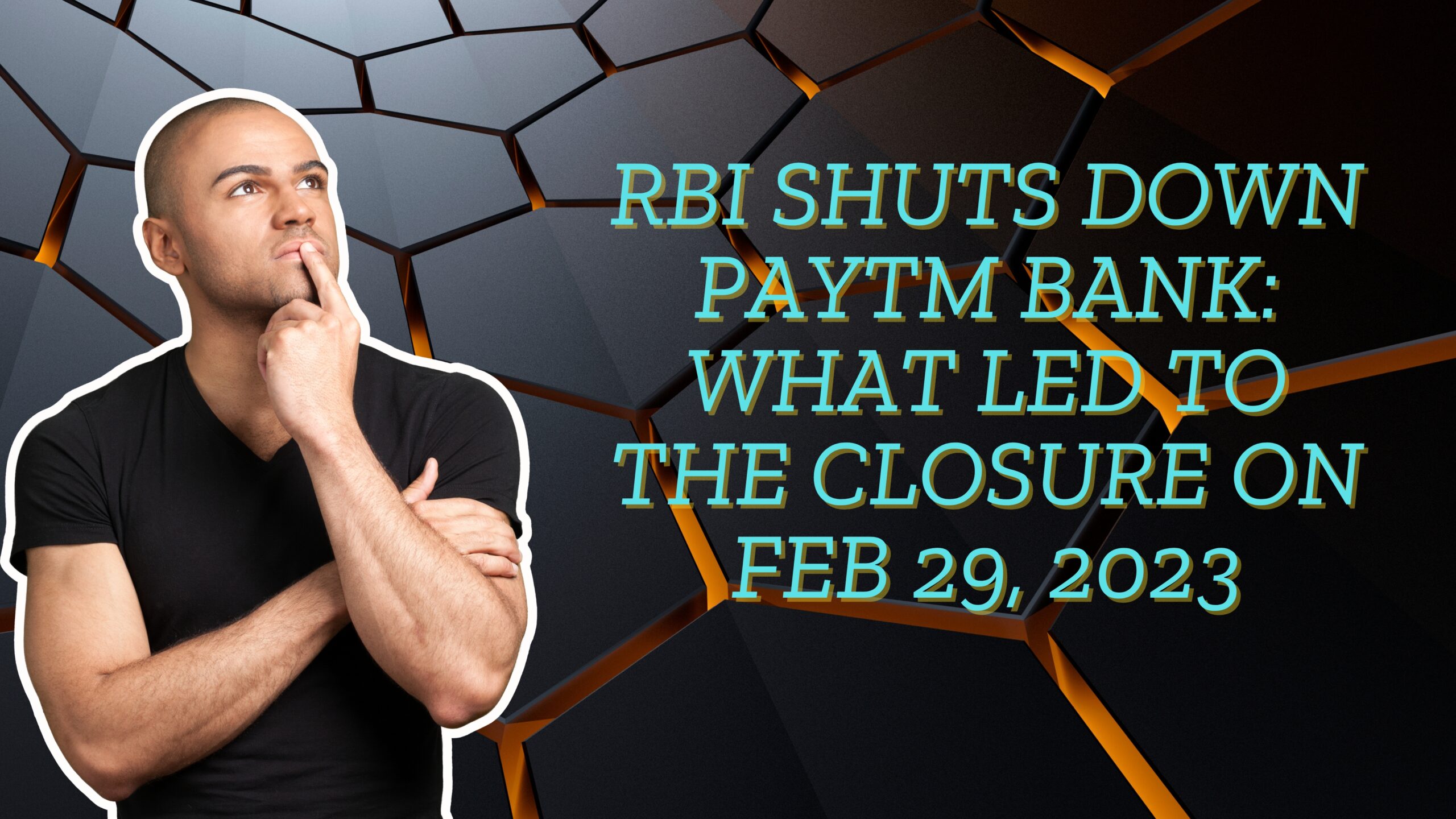The surprise announcement that Paytm Bank will shut on February 29, 2023 came from the Reserve Bank of India (RBI). This move has sparked tremors in the fintech industry, leaving many to question why such a significant step was made.
Background:
Paytm Bank, a subsidiary of One97 Communications, gained prominence in the Indian financial sector by integrating digital payments with banking services. Known for its user-friendly interface and innovative approach, the bank quickly amassed a considerable customer base.

Regulatory Concerns:
RBI’s decision to shut down Paytm Bank stems from concerns over regulatory compliance and risk management. There are concerns regarding the safety and security of client funds as a result of sources indicating that the bank did not comply with some important regulatory standards.
Governance Issues:
Reports indicate that governance issues within Paytm Bank played a pivotal role in RBI’s decision. Alleged lapses in corporate governance, coupled with concerns about financial irregularities, created an untenable situation for the regulatory body.
Customer Impact:
The closure of Paytm Bank will undoubtedly have a substantial impact on its customers. The RBI has assured a systematic and well-orchestrated process for the transfer of deposits to other banks, ensuring minimal disruption for accountholders.
Paytm’s Response:
In reaction to the RBI’s decision, Paytm has released a formal statement emphasizing its commitment to collaborating with the regulatory organizations. The company assures its customers that their interests and financial assets remain a top priority during this transition.

The closure of Paytm Bank serves as a stark reminder of the regulatory challenges faced by fintech companies.
To guarantee long-term sustainability, players must maintain a strong regulatory framework as the industry changes.
In conclusion, the fintech industry has been rocked by the RBI’s abrupt liquidation of Paytm Bank.
The incident highlights the importance of stringent regulatory compliance and effective governance in the rapidly changing landscape of digital banking. As customers await further instructions on the transition of their accounts, the industry at large will undoubtedly scrutinize this development for lessons and insights into the future of fintech in India.

Certainly! Let’s delve into these future actions with a personal touch:
- Empower with Enhanced Oversight: It’s time for regulators like the Reserve Bank of India to don their superhero capes and tighten the reins on digital banking platforms. With a vigilant eye on compliance and consumer protection, they can ensure that these platforms play by the rules, safeguarding the financial interests of everyday users.
- Illuminate with Transparency: Transparency isn’t just a buzzword; it’s the guiding light that leads users through the labyrinth of digital banking. Fintech companies need to step into the spotlight, shedding light on their services, fees, and regulatory compliance. By illuminating the path, they empower users to make informed decisions and navigate potential disruptions with confidence.
- Diversify for Resilience: Just as a well-balanced portfolio mitigates investment risks, spreading your financial wings across multiple banking institutions can shield you from the fallout of a single bank’s closure. It’s like having a diversified team of superheroes ready to swoop in and save the day when one hero falls.
- Educate for Empowerment: Knowledge is power, especially in the world of digital finance. So, let’s arm ourselves with financial literacy swords and shield ourselves against uncertainty. Through education and awareness, we can empower ourselves to make wise financial decisions and protect our hard-earned money.
- Advocate for Justice: Every hero needs a sidekick, and consumer advocacy groups are the unsung heroes fighting for justice in the digital banking realm. By rallying for consumer rights and championing fair policies, they ensure that the voice of the people is heard loud and clear.
- Innovate with Responsibility: Innovation is the engine driving the future of banking, but it must be fueled by responsibility. Fintech companies can wield their innovative powers for good, enhancing efficiency, security, and accessibility while staying true to the principles of regulatory compliance.
- Prepare for the Unexpected: In the face of adversity, a well-crafted crisis management plan is our trusty shield. By preparing for the unexpected and fostering a culture of resilience, we can weather the storm and emerge stronger on the other side.
- Unite for Strength: Alone, we may be strong, but together, we are unstoppable. Through collaboration and cooperation, we can harness the collective strength of regulators, financial institutions, fintech companies, and consumers to build a more resilient and inclusive digital banking ecosystem.

Let’s answer some questions you have regarding Paytm Bank:
Q: Why did Paytm Bank close its operations?
Ans: Paytm Bank cited “commercial reasons” for the closure, but the exact details have not been disclosed. However, it’s speculated that regulatory issues, compliance challenges, and customer trust concerns may have played a role in this decision.
Q: What happens to my money in Paytm Bank?
Ans: Rest assured, your money is safe. Paytm Bank is required to transfer your funds to an alternative bank of your choice or issue a cheque for the balance amount. You can also initiate the transfer yourself by providing your new bank details to Paytm.
Q: Will I lose access to my Paytm account?
Ans: No, you won’t lose access to your Paytm account. However, your Paytm Payments Bank services will be discontinued. You can continue using your Paytm wallet for digital transactions and other services offered by Paytm.
Q: How do I transfer my recurring payments and direct deposits to a new bank account?
Ans: You’ll need to update your bank details with any companies or individuals who make direct deposits or process recurring payments from your Paytm Bank account. This includes employers, utility companies, subscription services, etc.
Q: Can I still use my Paytm debit card?
Ans: No, your Paytm debit card will be deactivated. If you have any recurring payments linked to your debit card, remember to update your payment information with the new bank account details.
Q: What should I look for in a new bank?
Ans: When choosing a new bank, consider factors such as convenience, accessibility, fees, interest rates, customer service, and security features. Take the time to research and compare different options to find the best fit for your financial needs.
Q: How can I ensure the safety of my funds in the future?
Ans: To safeguard your funds, opt for banks and financial institutions that are reputable, licensed, and regulated by the appropriate authorities. Stay vigilant against phishing scams, unauthorized transactions, and identity theft by regularly monitoring your accounts and practicing good security habits.
Conclusion:
In our journey towards a safer and more stable financial future, let’s embrace these future actions with courage, conviction, and a dash of creativity. After all, in the ever-changing landscape of digital banking, a little ingenuity can go a long way.










GOOD ARTICLE.